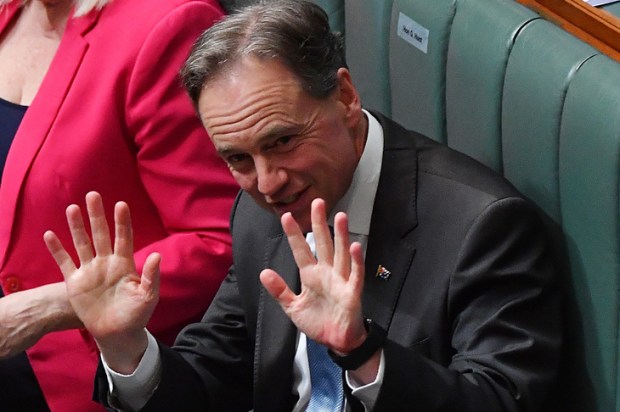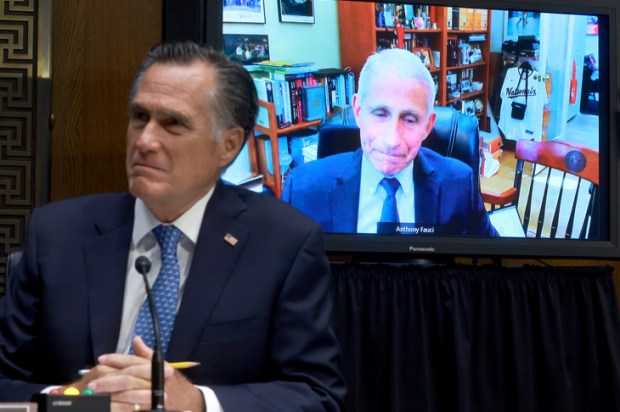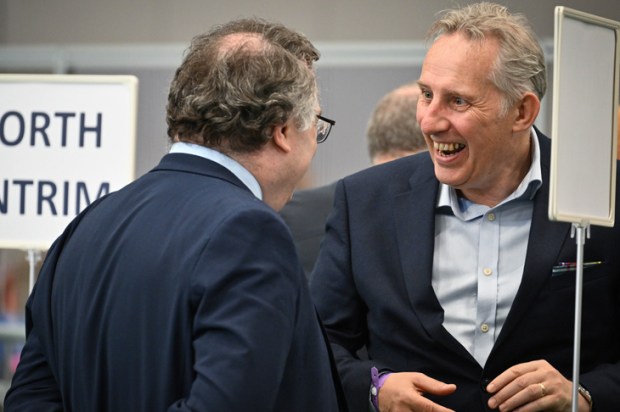Some governments and parliaments seem to suffer from the fatal conceit that they can create new reality simply by declaring it so. After the brief but humiliatingly one-sided border war with China in 1962, India’s parliament declared the correct border was exactly as claimed by India and no Indian government was authorised to negotiate to the contrary. (I don’t know if that law still holds.) Similarly, Ottoman Turks committed the first genocide of the 20th century in 1915, killing about 1.5 million Christian Armenians. Silence and denial of the atrocity by Turkish authorities is buttressed by Article 301 of Turkey’s Penal Code that criminalises any acknowledgment of the Armenian genocide as a denigration of Turkishness.
In a short speech in Parliament on 10 August, George Christensen decried ‘the madness of lockdowns’. Masks ‘make no significant difference in stopping the spread of Covid-19’, he said, while lockdowns destroy people’s lives and livelihoods and curtail freedoms without destroying the virus. He didn’t reject vaccines but opposed domestic vaccine passports as ‘a form of discrimination’ and questioned their justification when the vaccinated can still catch and spread the virus. He concluded that Covid-19 will be with us forever, some people will continue to die, but we have to learn to live with it just like with flu. Among others in recent days, Iceland’s chief epidemiologist and the director of the Oxford Vaccine Group has also said that herd immunity is not going to be reached through mass vaccinations and we must learn to live with the virus.
The mainstream media narrative described this as an anti-lockdown ‘rant’ by a ‘rogue’ MP. For added emphasis Christensen repeatedly described several of his assertions as ‘fact’. That may have been a mistake but putting that and his other statements and actions aside, every single one of his key claims is under vigorous debate in the global scientific community. Perhaps stung by the attacks on the ‘posturing politicians, the sensationalist media elite, and the dictatorial medical bureaucrats’, Labor introduced a motion condemning his remarks and it was passed with most Coalition MPs voting for it and none voting against. Both sides simply dismissed the comments as misinformation without addressing any of the assertions. This was wise, for he is on pretty solid ground. As at 14 August, only 0.06 per cent of the world’s 17 million active cases were listed as ‘serious or critical’ on Worldometer.
Scepticism towards lockdowns and masks was the reigning scientific and policy consensus before 2020 as articulated in documents from the WHO and several national governments, including Australia and the UK. Does any MP have the courage to deny this ‘fact’? If not, is any one of them ignorant and silly enough to claim that ‘settled’ science built up over a century can be overturned in a matter of weeks?
My assessment of the efficacy of masks was published in the Speccie on 6 February. In a terrific review of the updated evidence in City Journal (11 August), Jeffrey H. Anderson discusses fourteen randomised controlled trials – the gold standard of scientific research – testing the effectiveness of masks in stopping the transmission of respiratory viruses. While three suggest they might be useful, eleven suggest either uselessness or even net harm. Christensen was right: while serving as highly visible symbols of mass compliance with government edicts and signalling virtue, masks do little to control virus spread.
China’s brutal crackdown was against the weight of scientific opinion at the time but Western governments were impressed by dubious claims of success from Beijing in eradicating the virus, on the one hand, and panicked by the doomsday predictions of precision models created with flawed assumptions, on the other. Yet from the start, eminent epidemiologists and public health experts from world-leading institutions warned against the seductive models, saying that lockdowns could delay but not avoid the disease and would cause significant harms on health, mental health, social and economic outcomes. Over time their warnings have been amply vindicated even as many studies have accumulated to show that beyond international border closures before the virus has seeded in the community, and guidance on good health measures regarding personal hygiene and social distancing, restrictive lockdowns do indeed cause more net harms than benefits. While this is still contested by many other scientists, our own experience of repeated cycles of lockdowns in Victoria and now extended lockdown also in NSW – does reinforce the sceptical stance. The standout refutations of the lockdown cult remain Sweden in Europe and Florida and Texas in the US. Supposedly super-spreader events like maskless capacity crowds at football stadiums and rock concerts have failed to show subsequent spikes in cases. In the most recent Delta variant surge, Florida’s governor rejected lockdowns and mask mandates, explaining that the virus grows, plateaus and recedes. He’s been proven right within the week, with the 7-day rolling average of daily new deaths falling every single day from 87 on 4 August to 27 on the 15th.
Imagine if Christensen had spoken in parliament in early 2020 and suggested the virus might have leaked from the Wuhan Institute of Virology. In terms of the prevailing narrative at the time, this would have been condemned by the global scientific community as a conspiracy theory in line with the by-now notorious letter in the Lancet from 27 scientists on 27 February 2020. Imagine if Parliament had adopted a near-unanimous resolution to that effect, how discredited it would be today.
The reputational damage would have been as grave and enduring as that to the UN General Assembly resolution that ‘Zionism is a form of racism and racial discrimination’ (A/RES/3379, 10 November 1975). Israel’s Ambassador Chaim Herzog concluded his response thus: ‘For us, the Jewish people, this resolution based on hatred, falsehood and arrogance, is devoid of any moral or legal value’. He then tore up the resolution while still at the podium. US Ambassador Daniel Patrick Moynihan strode to the podium after the 111-25 vote to adopt it: ‘The United States rises to declare before the General Assembly of the United Nations and before the world, that it does not acknowledge, it will not abide by, it will never acquiesce in this infamous act’. He added: ‘There will be time enough to contemplate the harm this act will have done the United Nations’. As indeed it did until finally revoked in Resolution 46/86 on 16 December 1991 (Herzog was president of Israel at the time). The Christensen censure motion is not in the same league in its historical import, but all those who voted for it, in particular Coalition MPs who seem increasingly at odds with their own base, should nonetheless reflect on its significance for freedom of speech in Australia.
Got something to add? Join the discussion and comment below.
Get 10 issues for just $10
Subscribe to The Spectator Australia today for the next 10 magazine issues, plus full online access, for just $10.
You might disagree with half of it, but you’ll enjoy reading all of it. Try your first month for free, then just $2 a week for the remainder of your first year.














Comments
Don't miss out
Join the conversation with other Spectator Australia readers. Subscribe to leave a comment.
SUBSCRIBEAlready a subscriber? Log in